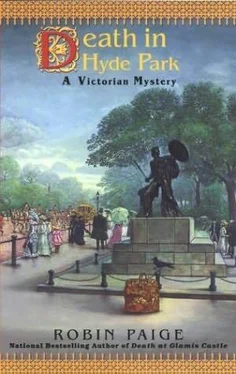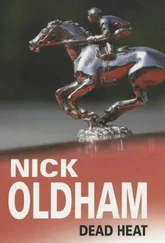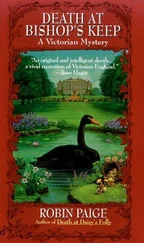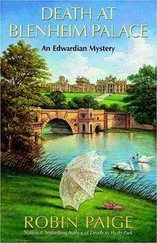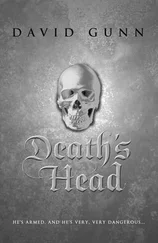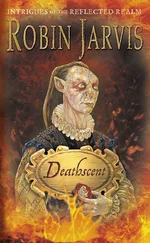Robin Paige - Death in Hyde Park
Здесь есть возможность читать онлайн «Robin Paige - Death in Hyde Park» весь текст электронной книги совершенно бесплатно (целиком полную версию без сокращений). В некоторых случаях можно слушать аудио, скачать через торрент в формате fb2 и присутствует краткое содержание. Жанр: Классический детектив, на английском языке. Описание произведения, (предисловие) а так же отзывы посетителей доступны на портале библиотеки ЛибКат.
- Название:Death in Hyde Park
- Автор:
- Жанр:
- Год:неизвестен
- ISBN:нет данных
- Рейтинг книги:5 / 5. Голосов: 1
-
Избранное:Добавить в избранное
- Отзывы:
-
Ваша оценка:
- 100
- 1
- 2
- 3
- 4
- 5
Death in Hyde Park: краткое содержание, описание и аннотация
Предлагаем к чтению аннотацию, описание, краткое содержание или предисловие (зависит от того, что написал сам автор книги «Death in Hyde Park»). Если вы не нашли необходимую информацию о книге — напишите в комментариях, мы постараемся отыскать её.
Death in Hyde Park — читать онлайн бесплатно полную книгу (весь текст) целиком
Ниже представлен текст книги, разбитый по страницам. Система сохранения места последней прочитанной страницы, позволяет с удобством читать онлайн бесплатно книгу «Death in Hyde Park», без необходимости каждый раз заново искать на чём Вы остановились. Поставьте закладку, и сможете в любой момент перейти на страницу, на которой закончили чтение.
Интервал:
Закладка:
Other challenges required the Yard to branch out in other ways. In the early 1880s, a Special Irish Branch of the Criminal Investigation Department was staffed with Irish officers and organized to deal with the Fenians, the Irish Dynamiters who blew up The Times office and a government office in Whitehall and set dynamite bombs in Scotland Yard, Trafalgar Square, and Westminster Hall. By the 1890s, however, the Fenian threat was replaced by the Anarchist threat, and the Special Irish Branch became simply the Special Branch. The Continental terrorists making their way to England-Italian, French, Spanish, and Russian-seemed to believe that a few bombs were neither here nor there, and through the nineties, members of the Special Branch were kept busy hunting for bomb factories, pursuing accused bombers and their accomplices, and keeping a wary eye on those they suspected of plotting terrorist activity. There were Anarchists in Walsall and a botched explosion in Greenwich Park (which Joseph Conrad used as the inspiration for his novel The Secret Agent), followed by bomb bursts in Mayfair and in the Underground, together with a half-dozen other minor skirmishes.
All this uproar was followed by silence, an uneasy, fear-inducing silence that went on from the last three years of Victoria’s reign and into the first two years of Edward’s. Abroad, assassins were spreading terror among heads of state, while in England, Special Branch became increasingly anxious that a storm was brewing in the East End. But frustratingly, the police were left with little to do, except to keep a close watch on known and suspected Anarchists in the hope that they might commit a crime under the noses of the police. The Branch were assisted in this effort by the growing number of counterrevolutionary agents provacateurs who had begun to appear in London, sent by the Russian Secret Police to entrap Russian emigres who posed a threat to the Czar’s life and regime.
Inspector Earnest Ashcraft of the Special Branch was perhaps more frustrated than any of his colleagues, for he had a very strong sense of duty, and every day that passed without his being called upon to perform that duty was a day that he felt he had somehow failed. Ashcraft was a man in his early thirties, broad-shouldered and thickset. He deeply regretted having missed the excitement of the Fenians and the Walsall terrorists and that bang-up Greenwich affair, all of which had occurred while he was still a youth.
In fact, almost everything of note, Inspector Ashcraft often thought sadly, seemed to have happened before he joined the force in ’98-except for the Boer War, of course. He had done his duty there, not waiting to be called up but enlisting as soon as the trumpets sounded and shipping out on the very first transport to South Africa. But he had been struck by dysentery before he could fire a shot at the enemy, and had come back wasted, in what he felt in his soul to be a kind of mortal disgrace. The fact that Scotland Yard welcomed him back without question and even promoted him to the rank of Inspector made no difference to him. In his mind, his promotion had no redemptive qualities; he could only hope to redeem himself by some sort of significant action.
While others in the Special Branch may have been lulled by the seeming quiet on the Anarchist front, Inspector Ashcraft was convinced that these dangerous people were only biding their time. The times themselves were dangerous, for the end of the war threw thousands of men into the labor market, and large throngs of the unemployed marched through the streets of London, disrupting traffic and frightening law-abiding citizens. And even the employed were dangerous, for membership in the trade unions was rising and the unions held the cudgel of the strike in their hands. In this restive, rebellious climate, Ashcraft felt, any little spark might flame up into an uncontrollable conflagration. All hell would break loose, and unholy chaos would reign over law and order. But Ashcraft knew this could not be allowed to happen. When the peace and stability of society were threatened, Special Branch would be there to protect it. And Earnest Ashcraft, at last, would have the chance to do his duty.
To that end, over the past few months, Ashcraft had paid special attention to the half-dozen Anarchist groups in the East End. He was most interested in the Clarion, an Anarchist newspaper that had begun publication a decade ago under the editorship of a woman named Sybil Conway, whose daughter was now the editor. Ashcraft had studied the Clarion diligently, and in his opinion it was among the most inflammatory of all those published in the country; it stood to reason, therefore, that if a plot was brewing, the Clarion would be somehow involved.
Inspector Ashcraft’s interest in the newspaper had been further fueled by a man calling himself Dmitri Tropov, although Ashcraft had reason to believe that this was not his real name. At Tropov’s invitation, Ashcraft had met him in a dirty, crowded cafe near the docks. Tropov was a thin man, rather tall and dressed as an ordinary seaman, although his fingers were long and delicate, the fingers of a musician, perhaps, but hardly the hands of a sailor. There was something about his eyes, too-something watchful and wary, as if he were always on the lookout.
After some initial conversation, Tropov identified himself as a member of the Ochrana, the Russian Secret Police. He was especially interested, he said, in a man called Ivan Kopinski, who worked as a printer at the Anarchist newspaper, the Clarion. If Special Branch ever had occasion to detain or arrest Kopinski, Tropov would be glad to be notified, for Kopinski’s name was on his list of dangerous individuals. In fact, if the opportunity arose, Tropov would be delighted to take Kopinski off Ashcraft’s hands and arrange his clandestine deportation to Russia.
“One less Anarchist to trouble the Yard,” he had said with a chummy laugh, in perfect, unaccented English. “Right, Inspector?”
Ashcraft was not surprised by Tropov’s fluency or easy manner. That was the way of it with these Ochrana chaps-they spoke any number of languages, could assume any number of disguises, carry off any number of masquerades. The next time he saw Tropov, he might be an aristocrat, or a race-course tout, or (with those hands) even a woman. Of course, he couldn’t be trusted; those fellows would sell their mothers if they could make a profit thereby. But that was of little importance to Ashcraft, since Tropov was not in his employ. The man made him uneasy, however. It was those eyes, he thought, those endlessly watching eyes.
In the event, Ashcraft had agreed that one less Anarchist would indeed be a good thing, and had gone back to the Yard to inform Chief Inspector Mattingly about his conversation with the Russian agent. The press had been full of stories about the thaw in Anglo-Russian relations and the eventuality of an Anglo-Russian alliance, and Ashcraft was not surprised when the chief inspector suggested that he keep in close touch with Tropov, to learn what the man was up to.
“I shouldn’t wonder if the Foreign Office would be interested in hearing about this particular contact,” Mattingly said with a deliberative air. He was a round-faced, white-haired man with the look of a genial Father Christmas but a reputation that was a great deal more sinister. “And especially about Tropov’s interest in the Clarion ’s printer-that fellow Kopinski.” He paused, his eyes narrowing under bushy white brows. “One never knows about these things, Inspector. It could be that Kopinski is a nothing. On the other hand, he might be a something.” He stroked his white beard. “If you take my meaning.”
Ashcraft clasped his hands behind his back and said that he certainly took the chief inspector’s meaning.
“Well, then.” Mattingly picked up a sheaf of papers to signal the end of the interview. “I leave it to you, Inspector, to determine how to deal with the situation.” He would see to it, he added, that Tropov’s name was handed up to the assistant commissioner. If Ashcraft felt that he needed additional personnel to conduct surveillance or other activities, he might choose two or three Special Branch officers to assist him. If noses-informants-were needed, why, that would be no problem, either.
Читать дальшеИнтервал:
Закладка:
Похожие книги на «Death in Hyde Park»
Представляем Вашему вниманию похожие книги на «Death in Hyde Park» списком для выбора. Мы отобрали схожую по названию и смыслу литературу в надежде предоставить читателям больше вариантов отыскать новые, интересные, ещё непрочитанные произведения.
Обсуждение, отзывы о книге «Death in Hyde Park» и просто собственные мнения читателей. Оставьте ваши комментарии, напишите, что Вы думаете о произведении, его смысле или главных героях. Укажите что конкретно понравилось, а что нет, и почему Вы так считаете.
